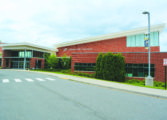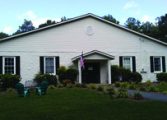School Board meeting held July 8
By Ruthann Carr
Correspondent
Students who decide to attend school in person will be there two days per week.
That’s the plan Fluvanna School Superintendent Chuck Winkler presented to the School Board Wednesday (July 8).
Winker said it is the best he can do to serve the learning and safety needs of Fluvanna children.
School will start Aug. 17 with students grouped alphabetically attending (A-K) Mondays and Thursdays, (L-Z) Tuesdays and Fridays.
“We can’t open all days to all students until we’re in Phase 4,” Winkler said.
All students will learn from home on Wednesdays while the schools are deep cleaned.
Winkler said 27 percent of parents who answered a survey said they intended to keep their children at home and do total virtual learning. That amounts to about 800 students.
Another survey will go out this week. Parents who choose virtual learning will be asked to make a nine-week commitment to that choice, Winkler said.
Having students attend two days per week allows for physical distancing on buses and in classrooms. Students must wear a mask when in enclosed spaces where the recommended six-foot distance can’t be maintained.
Winkler said students from the same family can sit together on the bus, but otherwise, students will be spread out. The newest recommendation is to maintain a three-foot distance on buses.
Schools will have disposable masks for students and are working on getting reusable cloth ones for each student.
Teachers will be provided a reusable cloth mask or a clear face shield depending on their particular need, Winkler said.
He hopes to provide in-school childcare for teachers who need it.
Winkler hasn’t decided yet if the teachers will have to pay for the care.
Andrew Pullen (Columbia) said teachers may get free childcare but “we’re telling our students, oh well.”
Winkler said providing childcare for approximately 160 teachers’ children would free up spots in community child care.
“But at their (parents’) cost,” Pullen said. “You see what I’m getting at.”
Winkler said providing childcare for teachers means they won’t be paying the teacher’s FMLA (Family Medical Leave Act) on top of paying a substitute teacher to take their place in the classroom.
“We’ll save money by using bus drivers and recess assistants (for childcare) who are contracted for a certain number of hours they won’t be working because of having Wednesday off. But we’re still exploring if we charge and what that would be,” Winkler said.
All students will be given a Chrome book and thumb drive for work at home. Parents must provide the Internet.
The school will be setting up Wi-Fi hotspots throughout the county for those who can’t get service at home.
Winkler said he has to supply the state with a back-to-school plan that includes a blueprint for teaching virtually if there is a COVID-19 outbreak and schools must be shut down.
All students will have their temperature checked before entering the school building and parents will be asked to assess their children each morning before sending them to school.
Winkler said the school will provide parents with information on how to assess for the illness.
If a student has a fever when their temperature is taken at school, they will go to a quarantine area and their parents will be notified.
Winkler didn’t yet have specifics on what will happen if a teacher or student tests positive for COVID-19, who will do the test, how notification will be done and what type of quarantine will take place.
He said it’s likely the health department will be responsible for testing and notification.
James Kelley (Palmyra) asked if the school had the authority to decide to close a classroom and have it go to online instruction.
“Have we defined what triggers the alarm bell? I’m hopeful that’s part of the mitigation plan,” he said. Winkler said he was looking for guidance on that.
Kelley asked if all the information will be written down so parents can see it.
Winkler said the instructional plan will be submitted on July 27, but the health plan isn’t due until Aug. 14.
“But we won’t wait until then. The two go hand-in-hand. We will get all of it into parent’s hands as soon as possible,” Winkler said.
Brenda Gilliam, executive director of finance and instruction, reported the schools would likely end fiscal year 2020 with a $1 million surplus. The money will be returned to the county.
The meeting was transmitted live via Google Meet and Facebook so the community could attend virtually. However there was technical difficulty and the first few minutes of the Facebook Live feed weren’t recorded.
During that time, one man came in person to make a public comment. He said his name was Brian McPherson. He had on a mask when he entered the building, but lowered it when he spoke.
“I’m not wearing a mask because I’m not afraid. This virus doesn’t scare me,” he said.
McPherson said he worked for Spotsylvania fire and rescue and regularly dealt with sick patients.
“When you say ‘I’m worried, I’m scared.’ It’s a slap in my face. I work 24-hour shifts. In six months I haven’t taken any kids in (ambulance transport to the hospital). It’s time we stopped being scared. We need to get back to normal…Don’t be so scared to die that you forget to live.”
After McPherson sat down and did not put his mask back on, Kelley asked him to do so.
Other citizens called in to comment, one asking Winkler to reconsider the Aug. 17 start date in favor of waiting until after Labor Day and one asked them to remember they are not battling each other, “it’s us versus COVID-19.” Another asked the board to think about teachers and what they’re risking.
All this took place just hours after President Donald Trump urged schools to fully reopen saying he “may cut off funding if not open.”
After those comments, Pullen called for a point of order and chastised Kelley for “talking down” to McPherson.
“We’re not better than them. We work for them. What just happened was unacceptable,” Pullen said.
Kelley said he wasn’t reacting to his comments.
“I’m actually thankful for it,” Kelley began.
“I understand. I understand,” Pullen said, interrupting. “But us talking down to people in the chairs is unacceptable”
Kelley continued, “I asked him if he would put his mask back on in the room because our policy and our notice on the board is masks will be required to be worn in the room at all times…”
Pullen said the board received an email from the chair saying that wouldn’t be enforced.
“So I’d say if there’s an issue call the sheriff and ask him to enforce it and move on, but we don’t holler at people that are sitting in the seats. We respect them and their beliefs,” Pullen said.
Kelley began again.
“I asked the gentleman to put his mask back on…I appreciated his comments. I’m thankful for them. They provide sometimes differing, sometimes not differing perspectives from my own, but I what I said was I suspect he was comfortable not wearing a mask but to respect the public health and the public good it would be better if he to put the mask on,” Kelley said. “I’m not sure what your point is because in my opinion nothing about what I asked was disrespectful or talking down to him.”
Pullen said, “Well that’s a point of contention, but we’ll move on.”
School Board meeting held June 30
School Reveals Plan to Mitigate Virus Spread
One thing is clear: There are no easy answers.
On a called school board meeting Tuesday, (June 30) Fluvanna School Superintendent Chuck Winkler laid out his plan for re-opening schools.
First, it looks like an Aug. 3 start is off the table.
Winkler said now he’s looking at Aug. 17, but it could be after Labor Day.
Nearly 3,000 responded to a community survey sent out by the schools. They weighed in on preferred type of instruction (assuming not all students would be on campus every day), available transportation, and their barriers to remote leaning.
With that input and physical distancing guideline set by the governor, Virginia Department of Health and the Centers for Disease control, Winkler’s plan is:
- Students attend in-person classes two days a week
- One group (students with last names beginning A-K) attending Monday and Thursday; the other attending Tuesday and Friday.
- Wednesday schools are deep cleaned
- Each student assigned a Chrome book and thumb drive
- During off days students will work on assignments
- All teachers wear masks
- Where physical distancing can’t be adhered to in an enclosed space – such as common areas and buses, students must wear masks
Perhaps anticipating push back, Winkler said: “My statement is ‘You’re going to get on the school bus, you’re going to wear a mask.’ That’s my statement for the start of the year.”
Andrew Pullen (Columbia) said, “Isn’t that something for the board to decide?”
“No,” Winkler said, “That is not something the board will decide.”
Pullen said his daughter will not wear a mask.
“So, you’re telling me she can’t ride the school bus?”
“That is correct,” Winker said.
Pullen asked about children who have health conditions.
Winkler said he researched that, and he plans on getting the reason in writing.
“The transportation piece is an option,” he said. “Riding the bus is a privilege, not a right.”
He later said if the school had to make an accommodation of providing car transport, they’ll make that decision when it comes up.
The conversation continued with Pullen wondering how schools can enforce mask wearing.
“You can’t make a kid stop picking their nose. How are you going to make them wear a mask? Pullen said.
Winkler suggested the student will get a warning. And if still not compliant, principals will have to determine what the consequence will be.
James Kelley (Palmyra) said it’s a matter of public health.
“We fundamentally have a responsibility to ensure the safety, health and well-being of our students,” Kelley said. “Even if masks aren’t ideal, fundamentally it’s our responsibility to make sure our kids are safe at school and masks are a part of that equation…we are legally responsible for the safety of our kids.”
Pullen questioned relying on the legal advice of school lawyers.
“I don’t understand how our lawyers, who have historically given us bad advice, they’re expressing to you what you can and can’t do, while other school districts would say otherwise,” Pullen said. “Why are we so very far apart from other school districts? We’re focused on the counties around us but there are other school districts that are pushing back. I don’t understand why their lawyers are saying this and their lawyers are saying that. These are guidelines. They are not legislation. They are not laws. They are not enforceable.”
Winker said the school districts Pullen referred to are in Southwest Virginia.
“And up until last week, they had very few cases.”
Pullen countered, “If not for our nursing home, we’ve had very few cases. On tenth of one percent of the population of Fluvanna. I’m just saying other school districts are coming up with different answers. Giles County. They’re literally looking at lawsuits to push back.”
Winkler said lawsuits may be inevitable.
“There will be lawsuits no matter what. I’m hoping to keep Fluvanna out of lawsuits, but more importantly I’m hoping to keep my students, our students and staff safe,” he said. “Someone is going to get sick. Some child K-12 is going to get sick in the Commonwealth. I pray it doesn’t happen in Fluvanna.”
Pullen said, “No children at this point in Fluvanna has had it (Covid 19).”
“I understand that,” Winker said. “We’ve been out of school.”
Pullen said according to information from the Thomas Jefferson Health District no child in Fluvanna has contracted the disease.
Kelley said TJHD records show 4.3 percent of Covid-19 cases in the district have occurred in the 0-9 age category.
The TJHD encompasses Charlottesville and Albemarle, Fluvanna, Greene, Louisa and Nelson counties.
The discussion continued with Pullen citing several reports recommending students go back to school.
“I’m just saying we’re basing everything on something that may happen. There are so many mays.”
Winkler said every decision made brings up more questions. But he said they needed to keep something in mind.
“Our job is not to eliminate risk, but to mitigate risk – to our staff and our students,” he said. “We have to submit a mitigation plan.”
Each member of the board at the end of the meeting expressed support for the work Winkler did and for the plan.
Except Pullen.
“I’m supportive of you; I’m not supportive of the plan, obviously,” he said. “I agree with the superintendent in southwest Virginia. I may be on the losing end of this…what we’re literally being fed is fear. We’re not seeing it in children. It’s not fair for someone else to tell Fluvanna how to re-open. There is so much confusion…it’s very politically charged, rather than following data and science.”
Winker said, “I don’t know if I could live with myself if we lost a child to this.”
To which Pullen replied, “(They’re) more likely to get into a car accident on the way to school.”
Winkler presented the plan again at the July 8 meeting.




